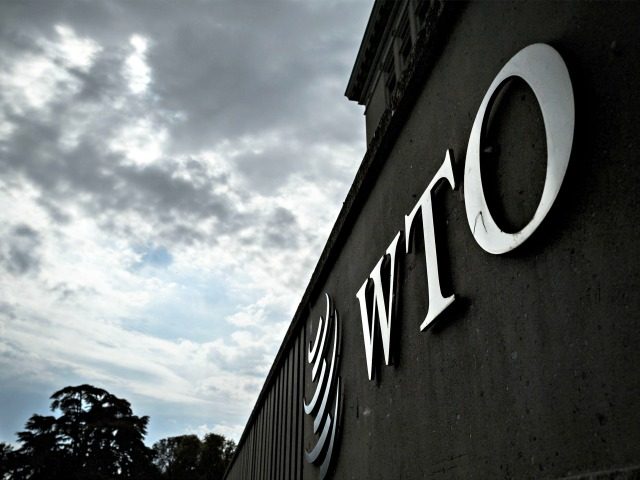The meeting of World Trade Organization (WTO) ministers in Abu Dhabi ran into a fifth day on Friday as most major issues remained deadlocked.
Some delegates feared the meeting could end without accomplishing anything noteworthy, although the first breakthrough was announced on Friday afternoon: a tentative agreement to extend the moratorium on e-commerce tariffs.
“I think we’re leaving here empty-handed,” one pessimistic delegate told Reuters on Friday, as many ministers from the WTO’s 164 member nations began returning home.
The WTO issued a memorandum warning members that “time is running out” to reach meaningful agreements. Reuters spotted delegates rushing about, gulping coffee, and banging away on their smartphones. One of them “mimed pulling the pin out of a hand grenade.”
The far-left New York Times (NYT) applauded the WTO for trying something different by treating the ministerial meeting as a genuine conference where delegates “started by listening to one another’s interests and goals” instead of just showing up with lists of demands and waiting for the haggling and horse-trading to commence.
The NYT quoted upbeat attendees who thought plenty of progress was made on regulatory reform, even as the headlines from Abu Dhabi spoke of political deadlock and few significant agreements signed.
Interestingly, the NYT credited this more responsive approach to former President Donald Trump because he rattled some cages no one else thought of touching:
This hopeful new way of doing business is the silver lining of the crisis that Donald Trump created five years ago when he refused to appoint new adjudicators to the W.T.O.’s appellate body. American officials had long complained that the appellate body, which functions like an appeals court for trade disputes, was writing new rules for global trade instead of just enforcing the rules that members had already agreed to. The Obama administration blocked the reappointment of one adjudicator for that reason. Then the Trump administration refused to appoint anybody at all. With no new appointments, that part of the W.T.O. died. Today, any country that doesn’t like a W.T.O. ruling can simply appeal it — to nobody. Thirty-one cases wait in that void for a decision that might never come.
One of the key players in the post-Trump WTO process was Guatemalan diplomat Marco Molina — by all accounts a hard-working and well-liked mediator — but he was suddenly and inexplicably sacked on February 21, just days before the ministerial meeting began. Guatemala transitioned from a conservative administration to that of leftist President Bernardo Arévalo in January.
“Well, you know, developing countries are quite complex, especially when you have unemployment. So totally unexpected. Many members are in shock. Yeah, that was not part of the plan,” Molina mused sportingly after getting the chop.
Besides losing a crucial dealmaker at the worst possible moment, the WTO meeting seems to have suffered from severe “fragmentation,” as too many of its members have dramatically different goals. Negotiators worked through the night on Thursday but still could not crack most of the deadlocks.
The Biden administration’s trade representative, Katherine Tai, blamed much of this fragmentation on the China-led BRICS group, whose founding members China and India strongly disagree on many issues. Smaller nations feel marginalized while large nations deal with economic slowdowns and budget crunches. Some delegates are reportedly reluctant to go all-in on deals with the Biden administration because they think Trump will return to the White House in 2024.
“Multilateralism” does not work terribly well when the participants have irreconcilable differences or feel compelled to block agreements for political reasons. Two parties might want to make a deal, but third, fourth, and fifth parties might see political benefits to blocking it. That sort of thing seems to be happening often in Abu Dhabi.
The United Arab Emirates (UAE) was so desperate for the meeting it hosted to be a success that it put $10 million in grants for WTO initiatives on the table, but the fifth day still dawned with no deals.
The first break in the deadlock arrived on Friday afternoon, as the WTO announced a tentative agreement to extend the existing moratorium on e-commerce tariffs for two years — a deal that reportedly required “marathon negotiations” to reach.
WTO members agreed not to impose customs duties on e-commerce in 1998, and the moratorium has been extended a few years at a time ever since. India and South Africa are among the nations that want to end the moratorium because they believe it prevents developing nations from collecting some $10 billion per year in revenue.
India itself believes it could collect $500 million per year by putting tariffs on e-commerce, thanks to sharply rising imports of content such as movies and video games. The developed nations that produce much of that content, such as the United States and Japan, would prefer to keep the moratorium in place.
India went into the WTO meeting determined to bring the moratorium down with support from South Africa and Indonesia. At the very least, these nations hoped to reduce the scope of the moratorium so some e-commerce transactions could be taxed, but in the end, they appear to have agreed to keep the status quo for another two years.
India is also at loggerheads with the European Union (EU) over customs and duties on information technology products such as smartphones and integrated circuits. India collects duties of up to 20 percent on imports of these technologies. The EU argues those duties violate some rather complex WTO rules.

COMMENTS
Please let us know if you're having issues with commenting.